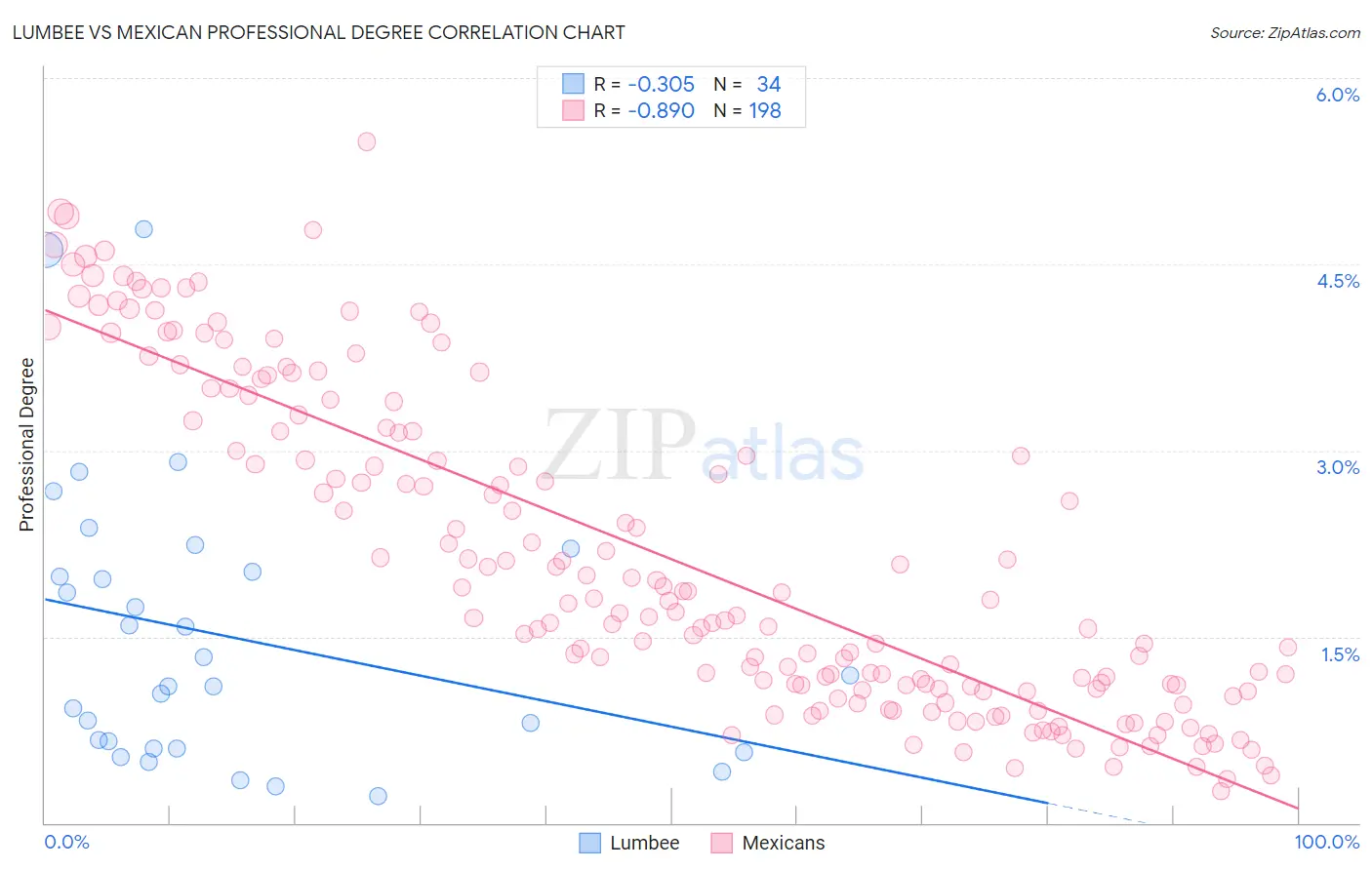Lumbee vs Mexican Professional Degree
COMPARE
Lumbee
Mexican
Professional Degree
Professional Degree Comparison
Lumbee
Mexicans
2.5%
PROFESSIONAL DEGREE
0.0/ 100
METRIC RATING
346th/ 347
METRIC RANK
2.7%
PROFESSIONAL DEGREE
0.0/ 100
METRIC RATING
343rd/ 347
METRIC RANK
Lumbee vs Mexican Professional Degree Correlation Chart
The statistical analysis conducted on geographies consisting of 92,157,121 people shows a mild negative correlation between the proportion of Lumbee and percentage of population with at least professional degree education in the United States with a correlation coefficient (R) of -0.305 and weighted average of 2.5%. Similarly, the statistical analysis conducted on geographies consisting of 557,026,409 people shows a very strong negative correlation between the proportion of Mexicans and percentage of population with at least professional degree education in the United States with a correlation coefficient (R) of -0.890 and weighted average of 2.7%, a difference of 11.7%.

Professional Degree Correlation Summary
| Measurement | Lumbee | Mexican |
| Minimum | 0.22% | 0.25% |
| Maximum | 4.8% | 5.5% |
| Range | 4.6% | 5.2% |
| Mean | 1.5% | 2.1% |
| Median | 1.1% | 1.7% |
| Interquartile 25% (IQ1) | 0.60% | 1.1% |
| Interquartile 75% (IQ3) | 2.0% | 3.2% |
| Interquartile Range (IQR) | 1.4% | 2.1% |
| Standard Deviation (Sample) | 1.1% | 1.3% |
| Standard Deviation (Population) | 1.1% | 1.3% |
Demographics Similar to Lumbee and Mexicans by Professional Degree
In terms of professional degree, the demographic groups most similar to Lumbee are Immigrants from Mexico (2.6%, a difference of 7.4%), Spanish American Indian (2.7%, a difference of 7.7%), Houma (2.2%, a difference of 11.1%), Immigrants from the Azores (2.8%, a difference of 14.8%), and Tohono O'odham (2.8%, a difference of 15.6%). Similarly, the demographic groups most similar to Mexicans are Immigrants from the Azores (2.8%, a difference of 2.8%), Tohono O'odham (2.8%, a difference of 3.5%), Spanish American Indian (2.7%, a difference of 3.6%), Immigrants from Mexico (2.6%, a difference of 4.0%), and Yup'ik (2.9%, a difference of 4.3%).
| Demographics | Rating | Rank | Professional Degree |
| Creek | 0.0 /100 | #328 | Tragic 3.1% |
| Bangladeshis | 0.0 /100 | #329 | Tragic 3.1% |
| Immigrants | Cabo Verde | 0.0 /100 | #330 | Tragic 3.1% |
| Kiowa | 0.0 /100 | #331 | Tragic 3.1% |
| Yakama | 0.0 /100 | #332 | Tragic 3.1% |
| Puget Sound Salish | 0.0 /100 | #333 | Tragic 3.1% |
| Pennsylvania Germans | 0.0 /100 | #334 | Tragic 3.0% |
| Natives/Alaskans | 0.0 /100 | #335 | Tragic 3.0% |
| Fijians | 0.0 /100 | #336 | Tragic 2.9% |
| Arapaho | 0.0 /100 | #337 | Tragic 2.9% |
| Navajo | 0.0 /100 | #338 | Tragic 2.9% |
| Immigrants | Central America | 0.0 /100 | #339 | Tragic 2.9% |
| Yup'ik | 0.0 /100 | #340 | Tragic 2.9% |
| Tohono O'odham | 0.0 /100 | #341 | Tragic 2.8% |
| Immigrants | Azores | 0.0 /100 | #342 | Tragic 2.8% |
| Mexicans | 0.0 /100 | #343 | Tragic 2.7% |
| Spanish American Indians | 0.0 /100 | #344 | Tragic 2.7% |
| Immigrants | Mexico | 0.0 /100 | #345 | Tragic 2.6% |
| Lumbee | 0.0 /100 | #346 | Tragic 2.5% |
| Houma | 0.0 /100 | #347 | Tragic 2.2% |